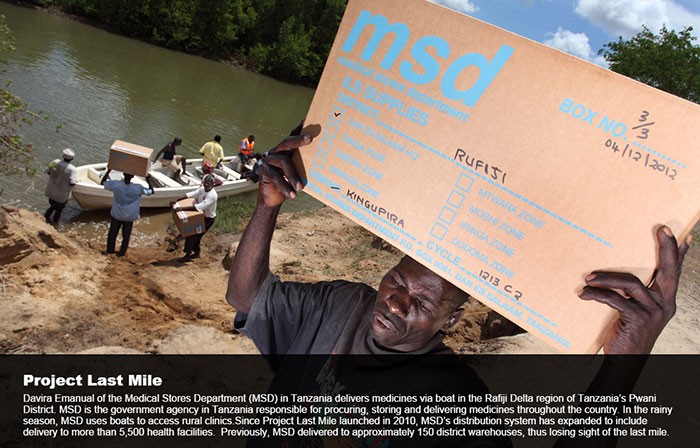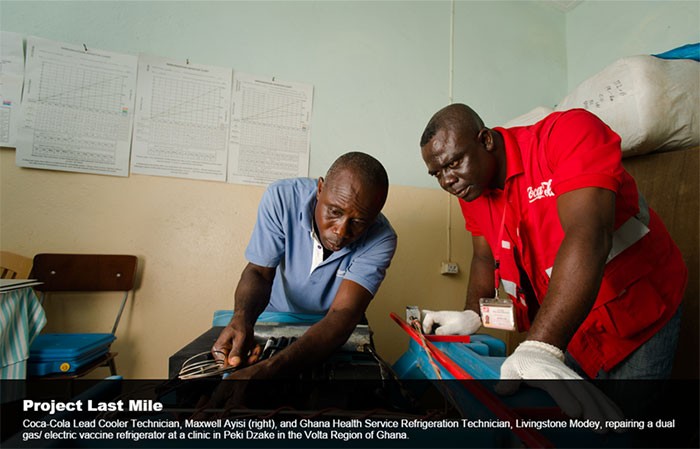- What We Do
- Agriculture and Food Security
- Democracy, Human Rights and Governance
- Economic Growth and Trade
- Education
- Ending Extreme Poverty
- Environment and Global Climate Change
- Gender Equality and Women's Empowerment
- Global Health
- Cross-Cutting Areas
- Emerging Pandemic Threats
- Family Planning
- HIV and AIDS
- Health Systems Strengthening
- Malaria
- Maternal and Child Health
- Neglected Tropical Diseases
- Nutrition
- Tuberculosis
- Water and Sanitation
- Working in Crises and Conflict
- U.S. Global Development Lab
“If one can find a bottle of Coca-Cola anywhere in the world, why not life-saving medicines?”
Complicated infrastructure and rugged environmental obstacles make delivery of essential medicines and critical supplies to remote communities in Africa extremely difficult for the government agencies who manage these distribution channels. While health facilities face product stock-outs and late deliveries, Coca Cola,faced with the same logistical roadblocks, has managed to maintain stocked shelves due to their business expertise in supply chain management and product distribution. Coca-Cola’s keen business acumen has helped the company expand its operations to more than 200 countries with more than 900 manufacturing facilities worldwide – each with their own distribution network. Therefore, it should come as no surprise that a partnership has formed to leverage Coca-Cola’s supply chain and distribution expertise to make critical health supplies and services available to the hardest to reach places or the “last mile” of select countries in Africa.
“Project Last Mile” (PLM) is a partnership supported by a unique set of actors, including The Coca-Cola Company, The Global Fund to Fight AIDS, Tuberculosis and Malaria, the U.S. Agency for International Development (USAID), and the Bill & Melinda Gates Foundation, each of whom bring different perspectives to the initiative. PLM builds institutional capacity to strengthen the supply chain and the overall health system by sharing private sector expertise with government agencies that manage the procurement and distribution of medicines. The partnership works within individual country contexts to set up a tailored program of interventions based on supply chain needs that can be addressed by Coca-Cola’s core competencies and capacities. Currently, PLM is working in Tanzania and Ghana with programs set up to meet the individual country’s supply chain needs.

In Tanzania, PLM has been working with the Medical Stores Department (MSD), the in-country government agency that manages the procurement, storage, and delivery of medicines throughout the country, to reorganize distribution channels and create more efficient supply chains. Prior to PLM’s involvement in 2010, MSD has been able to directly distribute essential medicines to 150 warehouse drop-off points. With the help of PLM, MSD has been able to directly distribute essential medicines to more than 5,500 health facilities. Additionally, PLM is helping MSD improve human resource management systems and processes.

In Ghana, PLM is supporting Ghana Health Services (GHS) on various vaccine-related initiatives. PLM is leveraging Coca-Cola’s market research expertise to help GHS better understand the reasons for low vaccine uptake within the country. This research will be used to create targeted messages to better educate the public about vaccines. Additionally, PLM is helping GHS better distribute vaccines, which have specific cold chain requirements – a major barrier to a broad consistent distribution network.
PLM is looking to expand its impact to 10 countries in Africa by 2020. If you are interested in engaging with the program or have further questions, please contact Marissa Leffler at mleffler@usaid.gov.
*Content provided by the PLM partnership program management office. Additional technical partners including the Global Environment and Technology Foundation, the Yale Global Health Leadership Institute, and Accenture Development Partnerships (ADP) manage the execution and evaluation of the programs within the local context.







Comment
Make a general inquiry or suggest an improvement.